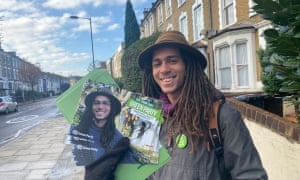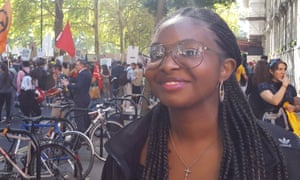In January, after she posed for a photo in Davos alongside Greta Thunberg and several other white climate campaigners, the Ugandan activist Vanessa Nakate was dismayed to see that the Associated Press news agency had cropped her out of the image. It started a global conversation about how the voices of black, Asian and minority ethnic people are erased from the climate crisis movement.
Climate activism has historically been perceived as a white, middle-class pursuit, but nothing could be further from the truth. Across the UK, BAME people are at the forefront of the fight against the climate crisis. Now, their efforts are being recognised by the Climate Reframe Project, an initiative spotlighting BAME voices in climate activism, funded by the Joseph Rowntree Charitable Trust and the Solberga Foundation, and put together by the team behind former Irish president Mary Robinson‘s Mothers of Invention podcast. Today, it features a list of the leading figures in the UK, some of whom shared their stories with me.
Why have BAME activists so often been ignored? “Historically, the environmental movement comes from a white, privileged background,” says Suzanne Dhaliwal, 37, who is researching BAME representation in the climate justice movement at the University of Brighton. “But climate change mostly affects people in the global south, so it’s fair to elevate those voices.”
Many of the people I speak to have at times felt excluded. Nish Doshi is a 32-year-old climate justice organiser from Edinburgh. When Doshi – who is non-binary, and uses they/them pronouns – goes to Cop26 organising meetings for civil society alongside NGO leaders, they often find they are one of the few BAME people in the room. “There will be 50 or 60 people there, and hardly any people of colour,” they say. “They don’t even think about that at all.”

Criticism has also been levelled at Extinction Rebellion (XR), with BAME people pointing out that its tactic of encouraging protesters to get arrested ignores the reality that people of colour are disproportionately likely to be targeted in their interactions with police.
Yet BAME people have been central to climate activism for decades. Farhana Yamin, 55, is the international climate lawyer responsible for getting the target of net zero emissions by 2050 included in the Paris accord. She came up with the goal after growing tired of the incremental advances promised by the carbon emission trading system. “I wanted to think bolder and bigger – no more mucking around with carbon budgets,” Yamin says. “These gases are toxic. We shouldn’t create trading systems for toxic pollutants.”
Recent years have seen the movement work to address its diversity problem. “When Vanessa was cropped out of that photo, that brought about a lot of healthy debate,” says Tyrone Scott, 28, an activist from London. He has been working tirelessly to get younger people into the movement, going into pupil referral units to teach students about the climate emergency. “They are so engaged,” Scott says. “It gives you so much hope for the future.”
The 16-year-old Londoner Jessica Ahmed says she used to think: “Climate change doesn’t affect me. It’s not an African-person problem.” But she became an activist after attending the May 2019 school climate strikes. “I’ve never fallen behind with school,” she says. “I think I’m more on track than most people who don’t go on the strikes.” She now organises for the UK Student Climate Network, mobilising her classmates. “It sucks that we have to miss school,” she says. “But we need to make our voices heard because it’s us that are going to be the most affected by climate change.”
Like Ahmed, the Manchester-based pupil Lillia Adetero, aged 10, has been striking from school, attending the Fridays for Future protests since January 2019. She often gives speeches at these strikes. “I talk about how climate change is going to affect our future and how the government isn’t doing enough,” she says. Adetero was delighted by the court of appeal ruling against the third Heathrow runway. “I’m very happy that Heathrow has been cancelled,” she says. “I’d like them to stop the Manchester airport expansion, too.”

Others are trying to change the system from within. Scott stood as a Green MP candidate in Hackney South in 2019, doubling the party’s share of the vote. “It was a good experience,” he says. “But I was relieved the day after the election, I’m not going to lie. I was out every day, delivering thousands of leaflets for 10 hours at a time.”
Fatima Ibrahim, 27, from London, is a codirector of the Green New Deal UK, which lobbies for the British government to put the climate crisis at the heart of the economic system, rather than seeing it as a stand-alone issue. “We have an economic system that isn’t working for the climate,” she says. “We need a system-wide change.” Her activism is cutting through: the Green New Deal was included in the 2019 Labour and Green manifestos.
Many BAME activists feel a connection to the cause because they have family members in the vulnerable global south. Ibrahim is of Somalian heritage; her parents moved to the UK from Canada when she was nine. Climate activism has been her life’s work. “I was that crazy nine-year-old who watched Newsnight,” she says. “Coming from a refugee family made me aware of everything that was going on in the world. And it became clear to me that climate change was the biggest threat to people everywhere. If you care about injustice or refugees, all of those things will be 100 times worse if we don’t deal with the climate crisis.” She sees her Muslim faith as integral to her activism. “I have a responsibility for the people around me and a commitment to my community and other people,” she says.

Other activists have turned to nonviolent direct action to force the government to pay attention. Yamin joined XR after becoming depressed by Donald Trump’s decision to pull out of the Paris accord, and the release of an Intergovernmental Panel on Climate Change report in 2018 that warned we had only 12 years to avert climate catastrophe. “I fell into a state of real depression – actual depression – which I’d never had before,” says Yamin. “I felt that we had failed. We hadn’t saved the world at all. It felt really bleak.”
Direct action felt like a necessary corrective. “Our laws were being flouted,” says Yamin. “Laws that I helped put in place were being totally ignored.” She attended a number of XR direct actions. “I tried being arrested a few times and failed,” she jokes. “I thought: ‘I have to work harder at this being-arrested thing.'” Eventually, her wish was granted: Yamin was arrested after gluing herself to the Shell headquarters as part of the April 2019 XR protests.
But it’s possible to make a difference in less dramatic ways. “It was amazing,” says 38-year-old Dave Fuller, from London, of his experience cooking for the anti-fracking protesters at the Preston New Road site near Blackpool. “When people are doing frontline work, all they want at the end of the day is a hot meal. I went up worrying that people would feel like I wasn’t fulfilling my part, but everyone was thankful someone was willing to turn up with hot food on a cold day.” He now works for Repowering, an initiative bringing affordable renewable energy to local communities.
The law can also be a powerful tool. When Tessa Khan, a 37-year-old lawyer from London, heard about a landmark case brought by 900 Dutch citizens against their government for failing to uphold its climate commitments, she phoned the lawyers working on it. “I thought they were amazing,” says Khan. She went on to cofound the Climate Litigation Network, which helps citizens around the world to sue their governments on climate-crisis-related issues.
“The gap between what the governments are supposed to be doing to stop global warming and what they are actually doing is growing by the day,” says Khan. Her team of four lawyers is supporting activists in Ireland who are bringing a case against the government to demand more aggressive action on the climate crisis. “We need to hold governments accountable for the promises they are making,” says Khan. “In our view, it’s unlawful for them to be as deeply negligent as they are.”
All the activists I speak to are passionate about amplifying the voices of BAME people. “A big part of what I do is pushing for voices from the global south to be included in the climate change discussion,” says Doshi. They run workshops on climate colonialism and speak at events for youth leadership.
“We need more black, brown and working-class voices to be heard,” agrees Adetero. “They don’t really get the opportunity to have their voices heard that white people do.”
These are challenging times. “I am depressed about things,” says Doshi. “I see Trump pulling out of the Paris accord, the Trans Mountain pipeline in Canada, Bolsonaro taking away indigenous lands in Brazil.” But in spite of everything, there is also hope. “I feel like we have no choice but to be optimistic,” says Ibrahim. “The climate movement is massively growing. We’re reaching new people. The narrative is changing. We have to keep fighting against all odds.”